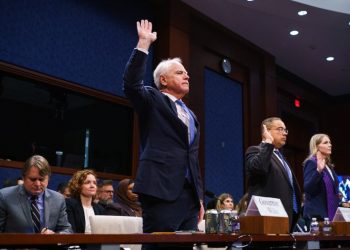A growing number of parents oppose requirements for routine vaccinations against measles, mumps and rubella (MMR) in order for children to attend school, according to a new survey released Friday by the Kaiser Family Foundation.
The survey found 35 percent of parents of children under age 18 oppose school vaccine requirements, up from 23 percent in 2019.
All states and the District of Columbia require children to be vaccinated against certain diseases, including measles and rubella, in order to attend public schools, though exemptions are allowed in certain circumstances.
The increasing opposition comes on the heels of heated partisan fights over COVID-19 vaccine mandates and a distrust of public health authorities.
The survey found 28 percent of all adults said that parents should be able to choose to not vaccinate their children, even if it creates a health risk for others, up from 16 percent in 2019.
Much like with COVID-19 vaccines, the growing opposition stems largely from people who identify as Republican or lean Republican. According to the survey, 44 percent said parents should be able to opt out of the MMR childhood vaccines, up from 20 percent in 2019.
In contrast, 88 percent of Democrats and those who lean Democratic said they support requiring the vaccines for public school students, mostly unchanged from 86 percent in 2019.
But the shift seems more about opposition to mandates and less about the shots themselves. Today 85 percent of the public and 80 percent of parents said the benefits of the measles, mumps and rubella vaccines outweigh their risks, little changed from 2019, when 88 percent of the public and 83 percent of parents felt that way.
Among adults who have not gotten vaccinated for COVID-19, 63 percent said that parents should be able to decide not to vaccinate their children, even if that creates health risks for children and adults.
About 1 in 4 unvaccinated adults said the risks of the MMR vaccine outweigh the benefits. But even among that group, there were still 70 percent who said the benefits of childhood MMR vaccines outweigh the risks.
The survey was based on interviews with a nationally representative sample of 1,259 adults and was conducted from Nov. 29 through Dec. 8, with a 4 percentage point margin of error.
Aside from childhood MMR vaccines, the survey also asked about the bivalent COVID-19 booster shot.
About 22 percent of adults said that they have already gotten the recommended bivalent booster shot, while 16 percent said they will get it as soon as they can. The bivalent booster targets both the original and omicron COVID-19 strains and has been available since September.
Among those ages 65 and older— the most vulnerable age group — about one-third said they don’t think they need it. A similar share said they don’t think the benefit of the updated booster is worth it.
About 23 percent of vaccinated adults ages 65 and older say they have not gotten the updated booster because they have been too busy or have not had time to get it yet.
Amid reports about a surge in flu and RSV cases among young children, parents are now at least as likely to worry about their children getting sick from those illnesses as from COVID-19, a sign that COVID-19 is no longer a singular concern and is increasingly becoming part of the normal seasonal virus cycle.
Roughly half of parents say they are at least somewhat worried that their children will get sick from RSV (56 percent), the flu (51 percent) and COVID-19 (47 percent).














